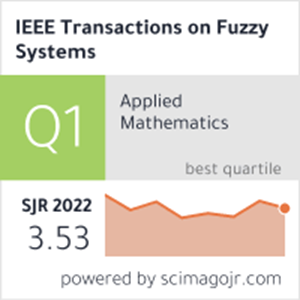An Improved Fuzzy Recurrent Stochastic Configuration Network for Modeling Nonlinear Systems
IF 10.7
1区 计算机科学
Q1 COMPUTER SCIENCE, ARTIFICIAL INTELLIGENCE
引用次数: 0
Abstract
Fuzzy recurrent stochastic configuration networks (F-RSCNs) have shown great potential in modeling nonlinear dynamic systems due to their high learning efficiency, less human intervention, and universal approximation capability. However, their remarkable performance is accompanied by a lack of theoretical guidance regarding parameter selection in fuzzy inference systems, making it challenging to obtain the optimal fuzzy rules. In this article, we propose an improved version of F-RSCNs termed IF-RSCNs for better model performance. Unlike traditional neuro-fuzzy models, IF-RSCNs do not rely on a fixed number of fuzzy rules. Instead, each fuzzy rule is associated with a subreservoir, which is incrementally constructed in the light of a sub-reservoir mechanism to ensure the adaptability and universal approximation property of the built model. Through this hybrid framework, the interpretability of the network is enhanced by performing fuzzy reasoning, and the parameters of both fuzzy systems and neural networks are determined using the recurrent stochastic configuration (RSC) algorithm, which inherits the fast learning speed and strong approximation ability of RSCNs. In addition, an online update of readout weights using the projection algorithm is implemented to handle complex dynamics, and the convergence analysis of the learning parameters is provided. Comprehensive experiments demonstrate that our proposed IF-RSCNs outperform other classical neuro-fuzzy and nonfuzzy models in terms of learning and generalization performance, highlighting their effectiveness in modeling nonlinear systems.一种用于非线性系统建模的改进模糊递归随机组态网络
本文章由计算机程序翻译,如有差异,请以英文原文为准。
求助全文
约1分钟内获得全文
求助全文
来源期刊

IEEE Transactions on Fuzzy Systems
工程技术-工程:电子与电气
CiteScore
20.50
自引率
13.40%
发文量
517
审稿时长
3.0 months
期刊介绍:
The IEEE Transactions on Fuzzy Systems is a scholarly journal that focuses on the theory, design, and application of fuzzy systems. It aims to publish high-quality technical papers that contribute significant technical knowledge and exploratory developments in the field of fuzzy systems. The journal particularly emphasizes engineering systems and scientific applications. In addition to research articles, the Transactions also includes a letters section featuring current information, comments, and rebuttals related to published papers.
 求助内容:
求助内容: 应助结果提醒方式:
应助结果提醒方式:


